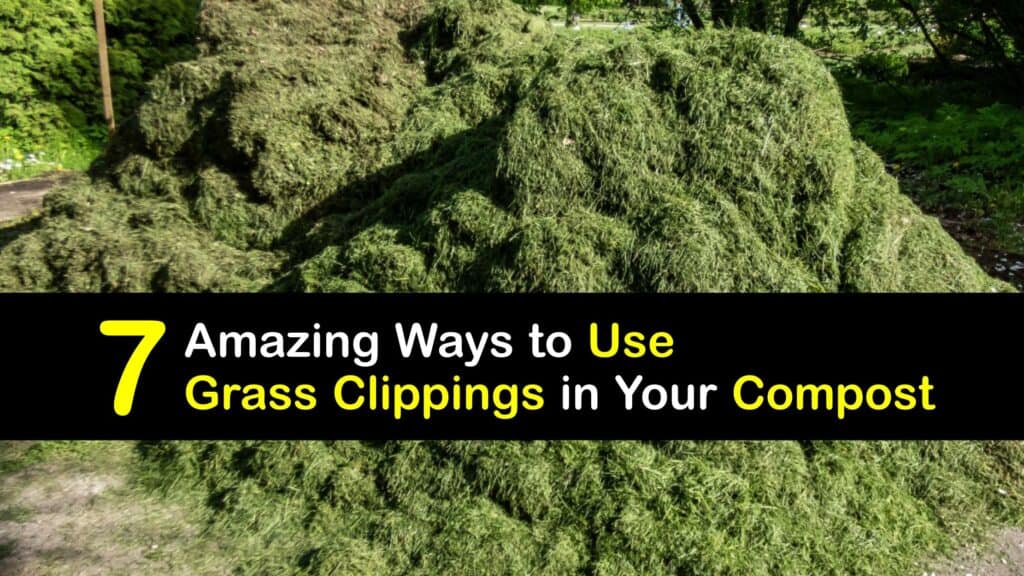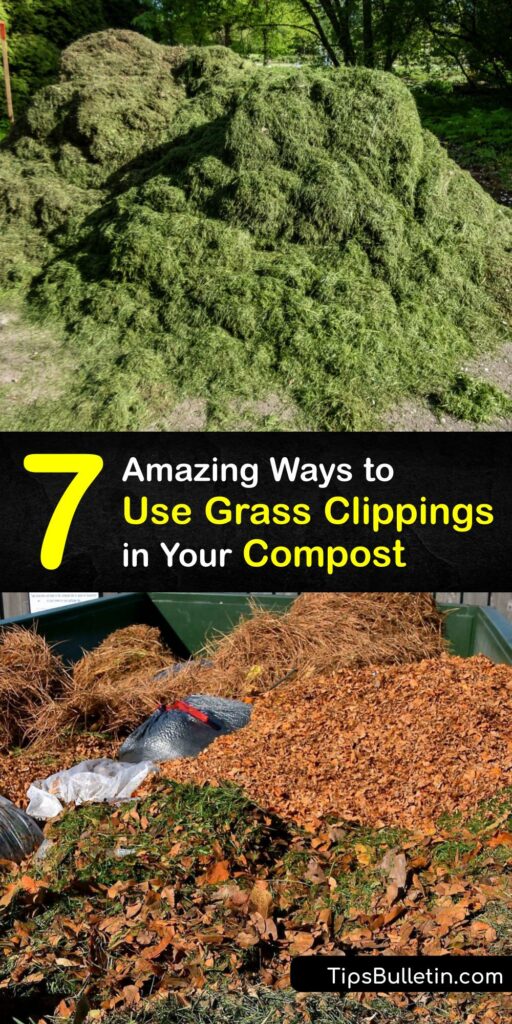Did you know that about 30 percent of annual waste can be recycled back into the earth? This includes everything from newspapers, kitchen scraps, and toilet paper rolls to leaves, twigs, and yard clippings. Discover the advantages of using grass clipping material, how to compost grass clippings and turn them into fertilizer.
Composting is a superb way to turn organic matter into a reusable product. The finished compost material is better for your lawn and plants than any chemical fertilizer you find at the hardware store. In fact, farmers call it black gold since compost is naturally nutrient-rich.
While composting grass and other organic material is relatively easy, it’s essential to add the proper ratio of browns and greens to the compost tumbler or bin for optimal decomposition. Moisture is also vital to the composting process, ensuring you get an earthy brown fertilizer for gardening.

How to Compost Grass Clipping Material
You probably don’t think twice about the lawn clippings when you cut grass. However, grass clippings are the perfect organic waste for creating fertilizer. Grass, twigs and leaves will compost quickly to create fertilizer faster. Learn the advantages of composting lawn trimmings and how to compost them with other scraps and yard waste.
Can You Compost Grass Clippings?
If you’ve ever raked the lawn grass after mowing and wondered what to do with those heaps of freshly cut grass, you’re not alone. Read on to discover all of the compostable items in your yard. Can you compost grass clippings instead of disposing bagged grass clippings at the curb?
Grass Composting
Are grass clippings good for compost? Yes, the grass cutting material from your lawn mower is a green material ideal for adding to the compost bin. The next time you’re performing lawn care, rake your grass clippings and add them to the compost heap.

What’s the Benefit of Composting Grass Clippings?
There are many good reasons for composting grass clippings, from environmental factors to creating homemade fertilizer. Explore the advantages of composting and how the compost material is beneficial to your lawn and garden.
Can grass clippings be composted? Yes, and they are a great source of nitrogen. Additionally, they improve soil health and aeration, lessen the need for pesticides and synthetic fertilizers, help control plant diseases, reduce waste, and promote the ecosystem in the dirt.
How to Compost Grass Clippings in a Bin
Composting is nature’s way of returning organic matter to the soil. Yet, there are steps to take to encourage decomposition. Prepare grass clippings compost and tend to the material through the composting process.
There are two main ways to compost; hot composting and cold composting. Hot compost uses oxygen-needing microorganisms to heat and break down organic waste rapidly. Cold compost is a slower approach that uses slower microorganisms that don’t require oxygen to ferment waste.
Whichever method you choose, putting grass clippings in compost in layers is vital. Start by adding coarse plant material, like twigs, and add a layer of fresh grass and other fine plant material. Follow this with an inch of manure or soil, and repeat the layers until the pile is the desired height.
For fast, hot composting, water the material right after you create the heap, continue watering it weekly, and turn the pile every three days. Cold composting requires very little water and turning.
Adding a Healthy Balance of Browns and Greens
It’s essential to add other materials when composting grass clippings to ensure the compost balances greens and browns. Learn the difference between green and brown materials and how to add them to the pile.
Browns are carbon-rich materials necessary for soil-dwelling organisms to break down the compost pile. They include fall leaves, straw, hay, pine needles, twigs, sawdust, paper, corrugated cardboard, and dry or woody plant material.
Greens are high in nitrogen and protein, which help the materials heat up. Grass clippings, vegetable and fruit scraps, coffee grounds, tea bags, eggshells, and animal manure are all green material examples.
Other Ways to Compost Grass Clippings
Can you compost grass clippings? Fortunately, the answer is yes. There are alternative ways to use grass for composting if your yard lacks space or you don’t have a compost bin. Follow some grass composting tips to prevent yard waste.
Pile composting is the most common way to use grass clippings. However, you can also use the clippings for grasscycling, in-ground composting, and mulching.
The simplest way to get the benefits of grass clippings is through grasscycling or when you leave the grass blades on the lawn after mowing it with a mulching mower. The mulching blade cuts the grass into finer pieces for quick decomposition on the turf.
In-ground composting is when you add grass clippings and food waste 18 to 24 inches deep in garden soil. Mulching is when you let the grass clippings dry and sprinkle a one to two-inch layer of the grass mulch around the base of your plants.
What NOT to Put in the Compost Pile
As much as we love to recycle, not everything is compostable, and some materials may even taint the compost pile. Discover which items cannot be composted in the yard to ensure that your final product is rich and organic.
Avoid placing meat, seafood, dairy products, and greasy foods in the bin to keep pests, vermin, and foul odors from taking over your compost pile. Additionally, do not place chemically treated materials, like wood and plants, in the compost heap to prevent contamination. Do not add pet or human waste that may contain parasites and bacteria.
How Long Do Fresh Grass Clippings Take to Compost?
Those new to composting always ask how long they have to wait for finished compost. The answer depends on whether it’s hot or cold compost and other factors. There is a general time frame to give you a rough idea for how to tell when the compost is ready.
Cold composting is the most uncomplicated method, yet it takes one to two years to finish. Hot composting only takes three weeks, depending on the pile size. In comparison, vermicomposting and manure composting take three to six months. Once your compost has an earthy color and texture, it’s ready to use.
If you leave the grass clipping directly on the lawn, they take three to four weeks to break down. A thick layer of grass-clipping mulch takes two to three months to fully decompose.
Composting is an excellent garden practice, whether you have a modest tumbler or a large compost pile. What better way to clean up the yard than toss grass clippings into the compost heap? The composting process turns scraps and waste into usable material that helps your plants and the environment.

Now that you’ve learned how to compost grass clippings and create a natural soil amendment from yard waste, why not share our tips for composting grass clippings with your friends and family on Pinterest and Facebook?